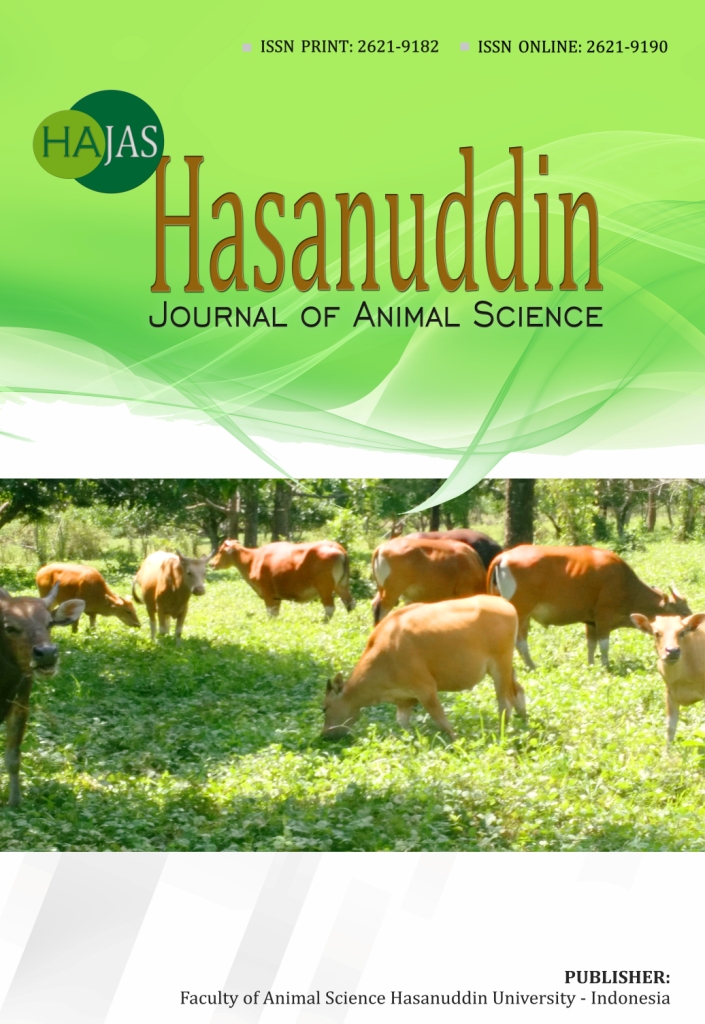The Physicochemical Properties of Goat Skin Gelatin at Different Ages With the Use of Lactobacillus plantarum and Acetic Acid as a Pretreatment
DOI:
https://doi.org/10.20956/hajas.v1i2.8150Keywords:
goat skin, gelatin, age, L. PlantarumAbstract
ABSTRACT Pretreatment of chemical acids using organic chemicals has been widely applied, while pretreatment using microbial Lactobacillus plantarum to form ossein in goat skin has not been done much. Application of Lactic Acid Bacteria (LAB) microbial species L. plantarum is thought to affect health and environment friendly. This study aims to determine the characteristics of goat skin gelatin at different ages of L. plantarum 1uhcc pretreatment and acetic acid (CH3COOH). Each treatment was repeated 3 times. The study design used a Split Plot Design with acid source treatment as the main plot and the age of goats 1, 2 and 3 years as subplots. The results showed a very significant effect (P<0.01) between the age of the goat with gel strength, pH, viscosity and color. The highest gel strength and viscosity at 1 year of age with L.plantarum pretreatment respectively (441.37±0.78 g bloom) and (9.22±0.09 cP). Goat skin gelatin has the highest pH at 1 year of age with L.plantarum 5.24±0.16. Similarly, the effect of gelatin (P<0.05) with a brightness level (L) 76.38±1.10 and redness (a) 11.13±1.58 affect the age of goats and acidic sources while yellowish (b) 33.81±2.34 only affects the acid source. Age of goats with different acid pretreatment has an impact on the physicochemical properties of goat skin gelatin. Goat age 1 year with L.plantarum pretreatment showed optimal results.Downloads
References
Arnesen, J. A., & Gildberg, A. 2002. Preparation and characterisation of gelatine from the skin of harp seal (Phoca groendlandica). Bioresource Technology, 82 (2), 191–194. (Journal)
Effendi Abustam, H.M. Ali, M. I. Said. Dan J.C. Likadja. 2008. Sifat fisik gelatin kulit kaki ayam melalui proses denaturasi asam , alkali dan enzim. Prossiding Seminar Nasional Teknologi Peternakan Dan Veteriner, 724–729.(Journal Prossiding)
Haug I.J and K.I. Draget. 2009. Gelatin. Handbook of Hydrocolloids, (4), 193–246. (book)
Juliasti, R., A. M. Legowo, Y. B. P. 2014. Effect of Concentration of hydrochloric acid soaking on goat leg bone affal towards gel strength, viscosity, color and clearness, ash and protein content of gelatine. Jurnal Teknologi Hasil Pertanian, 7(1), 32–38.(Journal)
Katherine Leon, Domingo Mery, Franco Pedreschi, J. L. 2006. Color measurement in L * a * b * units from RGB digital images. Food Research International, 39, 1084–1091.(Journal)
Ktari. N., I. Bkhairia, M, Jridi, I. Hamza, B. S. R. and M. N. 2013. Digestive acid protease from Zebra blenny (Salaria basilisca): Characteristics and application in gelatin extraction. UNESA Journal of Chemistry, 2(3).(Journal)
Magdić D, Jasmina Lukinac, Stela Jokić, F. Čačić-Kenjerić, M. Bilić, D. V., & University. 2009. Impact analysis of different chemical pre-treatments on colour of apple discs during drying process. Croat. J. Food Sci. Technol., 1, 31–35. (Journal)
M.I. Said, J. C. L. dan M. H. 2011. Effect of Time and Curing Concentration on Quantity and Quality of Goat Skin Gelatin Produced by Acid Process. JITP, 1(2), 119–128.(Journal)
Mulyani, S., Setyabudi, F. M. C. S., Pranoto, Y., & Santoso, U. 2017. J.Indonesian Trop.Anim.Agric 42(60), 14–22. (Journal)
Ockerman H.W and C.L. Hansen. 2012. Animal By-Product Processing & Utilization. In CRC Press .Vol. 66 (book)
Pimchanok Kaewudom, S. B. and K. K. 2012. Effect of bovine and fish gelatin in combination with microbial transglutaminase on gel properties of threadfin bream surimi. International Aquatic Research, 4(12), 1–13. (Journal)
Ratna C. Rares, Meity Sompie, Arie Dp. Mirah, J. A. D. K. 2017. Pengaruh Waktu Perendaman Dalam Larutan Asam Asetat (CH3COOH) Terhadap Karakteristik Fisik dan Kimia Gelatin Ceker Ayam. Jurnal Zootek, 37(2), 268–275. (Journal)
Ririn puspadewi, putranti adirestuti, gina anggraeni, & Jurusan. 2011. Aktivitas Metabolit Bakteri Lactobacillus plantarum dan Perannya dalam Menjaga Kesehatan Saluran Pencernaan. Konferensi Nasional Sains Dasar Dan Aplikasinya, 1–11.(Journal Prossiding)
Said, M. I., Triatmojo, S., Erwanto, Y., & Fudholi, A. Gelatin Properties of Goat Skin Produced by Calcium Hydroxide as Curing Material. Media Peternakan, 184–189. (Journal)
Said, M. I., Triatmojo, S., Erwanto, Y., & Fudholi, A. 2011. Characteristics of Goat Skin Gelatin That Produced Through Acid and Alkali Process. Agritech, 31(3), 190–200. (Journal)
Shyni, K., Hema, G. S., Ninan, G., Mathew, S., Joshy, C. G., & Lakshmanan, P. T. 2014. Food Hydrocolloids Isolation and characterization of gelatin from the skins of skipjack tuna ( Katsuwonus pelamis ), dog shark ( Scoliodon sorrakowah ), and rohu ( Labeo rohita ). Food Hydrocolloids, 39, 68–76. (Journal)
Sompie, M., Triatmojo, S., Pertiwiningrum, A., & Pranoto, Y. 2012. The effects of animal age and acetic acid concentration on pigskin gelatin characteristics. J.Indonesian Trop.Anim.Agric., 37(3), 176–182. (Journal)
Sultana, S., Ali, M. E., & Ahamad, M. N. U. 2018. Gelatine, collagen, and single cell proteins as a natural and newly emerging food ingredients. In Preparation and Processing of Religious and Cultural Foods.(book)
Ulfah, M., Zdv, H. S., Wr, F., Lqàxhqfh, G., Dfhwlf, R. I., Vroxwlrq, D., Jhodwlq, S. R. I. 2012. Pengaruh Konsentrasi Larutan Asam Asetat Dan Lama Waktu Perendaman Terhadap Sifat-Sifat Gelatin Ceker Ayam. Jurnal Agritech Fakultas Teknologi Pertanian UGM, 31(3), 161–167. (Journal)
Yang, L., Yuan, X., Li, J., Dong, Z., & Shao, T. (2018). Dynamics of microbial community and fermentation quality during ensiling of sterile and nonsterile alfalfa with or without Lactobacillus plantarum inoculant. Bioresource Technology. (Journal)










